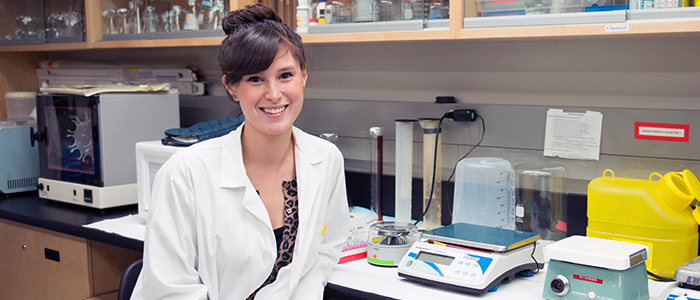Harnessing the power of a personal connection

Jennifer Au is no stranger to Alzheimer’s disease. Not only is her research focused on the disease, but she has a personal connection to it as well.
“Throughout my life, I have been surrounded by Alzheimer’s disease. Currently both of my grandparents are living with it, and I also dedicate a lot of my time to volunteering with the Alzheimer Society,” Au said. “I cannot begin to explain what it would mean to me if I helped discover something that changed the disease.”
While Au grew up in London, Ontario, she decided to complete her BSc at the University of Guelph with a major in human kinetics. After reading about some of the research being done in the Department of Anatomy and Cell Biology at Schulich Medicine & Dentistry, meeting with potential supervisors and speaking to students about their experiences, she knew it would be a good fit. She is now an MSc Candidate with the Department.
“I think it’s important to be comfortable in general, but also comfortable intellectually in a research environment, and that is how I felt in the Department of Anatomy and Cell Biology,” she said. “Compared to my experiences in the past, I feel that I am much more confident and comfortable in this research environment, and I am more comfortable making mistakes and expressing my thoughts and ideas to faculty members and students.”
Au was one of this year’s recipients of the Master's and Doctoral Scholarships sponsored by the Alzheimer Society in London and Middlesex. She is currently studying the interaction between Alzheimer’s disease and stroke using an antioxidant enzyme as a therapeutic treatment. After her graduate degree, she is planning on pursuing medical school and possibly focusing on geriatrics and/or neurology.
Working in the lab is Au's favourite part of her studies. She is able to complete the experiments to support her research questions, troubleshoot problems, and even think about her research in a practical way.
“Of course there are times when it is extremely frustrating, when experiments are not working out or when suddenly you have a large amount of work on your shoulders that you had not planned for, but that is all part of the learning experience,” she said.
Even though her work goes through ups and downs, she has a strong support system outside her work that has always helped her remain positive. And, if she really gets down, she thinks about her own grandparents and how they are currently struggling with Alzheimer’s and she quickly bounces back.
“I hope that through my work and dedication, I can make a difference to those who are affected by the disease in the future," she said. "And maybe in my own grandparents’ lives.”








